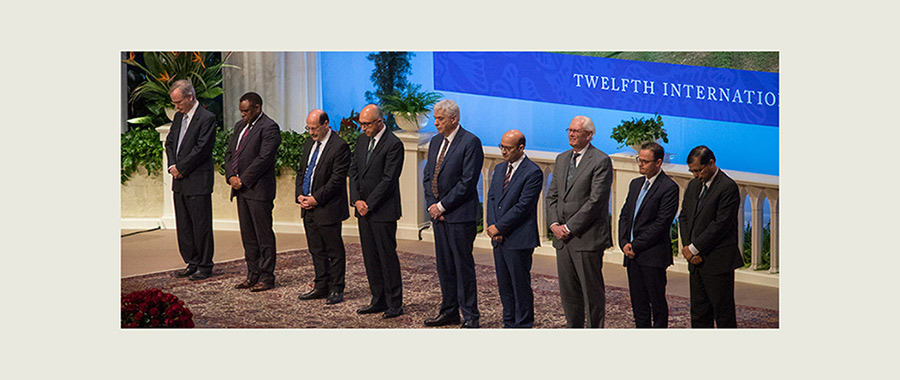The Bahá’í Faith, which arose in the mid-19th century, is not just a religion but a comprehensive worldview that offers profound insights into the human condition, global unity, and social justice. One of its pivotal institutions is the Universal House of Justice, which serves as the supreme governing body for the Bahá’í community worldwide. Understanding how its members are elected reveals not only the uniqueness of the Bahá’í administrative framework but also the deeper significance of those processes in fostering a global perspective of collective action toward peace and justice.
The election of the Universal House of Justice occurs every five years and is characterized by an absence of partisan politics and electoral campaigning. This distinctive feature alludes to a higher purpose: the focus on meritocratic and community-oriented governance rather than individual ambition. Each National Spiritual Assembly, the primary governing body in each country where Bahá’ís reside, is tasked with electing the members of the Universal House of Justice. This multilayered electoral structure emphasizes the importance of a collective voice in choosing spiritual guidance, illustrating a profound belief in the inherent capacity of communities to discern and select capable leaders.
At the outset, it is important to acknowledge that the election is conducted through a straightforward yet remarkable process. Unlike conventional options available in democratic systems, Bahá’ís do not resort to nominations, nor do they engage in public debates or promotions. Instead, the elections are carried out through a secret ballot, whereby members of the National Spiritual Assemblies cast their votes based solely on their prayerful deliberation and understanding of the candidates’ qualifications. This practice signifies a commitment to spiritual principle over material persuasion, allowing the electorate to focus on the character, experience, and divine attributes of the candidates.
Moreover, the election process centers around the concept of prayer and reflection, emulating a spiritual atmosphere that transcends personal ambitions. Voters are encouraged to engage in prayerful consideration prior to casting their ballots, thereby fostering an environment steeped in spiritual consultation rather than analytical deliberation. This paradigm of election highlights a distinctive Bahá’í belief that guidance can emanate from divine sources, making the exercise an act of collective supplication rather than a mere administrative task.
Once elected, members of the Universal House of Justice serve a five-year term, which can be renewed indefinitely barring any impediments—invariably creating a lineage of experienced leadership. Importantly, these leaders are not regarded as prophets or infallible authorities but are seen as members of the community who are charged with guiding society toward its higher aspirations. Their role embodies an adherence to consultative governance, reflective of Bahá’í teachings that emphasize the collective over individual decision-making. As such, their ability to confer is paramount, guiding the Bahá’í community through essential pathways of action that align with spiritual principles.
The dynamics of leadership within the Universal House of Justice operates under a set of distinctive laws, which are articulated in canonical texts such as the writings of Bahá’u’lláh and ‘Abdu’l-Bahá. All decisions emanated from the House must resonate with both scriptural injunction and collective wisdom. While the members deliberate on diverse issues ranging from community-building measures to social justice initiatives, their decisions echo the necessity of aligning with divinely ordained principles. It is imperative to consider that the Universal House of Justice, in its guiding role, actively seeks to nurture a global culture of solidarity grounded in equitable notions of justice.
Skepticism regarding authority structures is not unusual within sociopolitical realms, where charismatic leadership often invites criticism. Nevertheless, the electoral approach for the Universal House of Justice brings a refreshing orientation away from typical authoritarian leadership models. Election devoid of competitive aspirations permits leaders to focus on unified objectives, fostering dialogue and cooperation within the global community. This synergy exemplifies a transformative paradigm, primed for cultivating a conducive environment toward lasting peace and shared prosperity.
The international scope of the Universal House of Justice underscores its role not simply as a governing entity but rather as a harbinger of global consciousness, addressing multifaceted challenges facing humanity. Whether that be promoting educational initiatives or devising strategies for environmental sustainability, the House is engaged in a critical evolutionary role within the rapidly changing dynamics of society. Its governance is symbiotic, shifting in reflection to the needs and aspirations of the global Bahá’í community, while remaining anchored by a profound commitment to Bahá’í principles.
In summation, the election of the Universal House of Justice transcends ordinary political paradigms, presenting a unique model of governance that harmonizes spiritual guidance with collective action. Through an electoral process characterized by prayerful reflection, the Bahá’í community collectively affirms its commitment to morally grounded leadership, enhancing the efficacy of its global vision. Examining this electoral structure elucidates the deeper philosophical tenets of the Bahá’í Faith—pursuing the collective good, fostering unity, and promoting collaboration among diverse peoples for the realization of a more just and equitable world.
